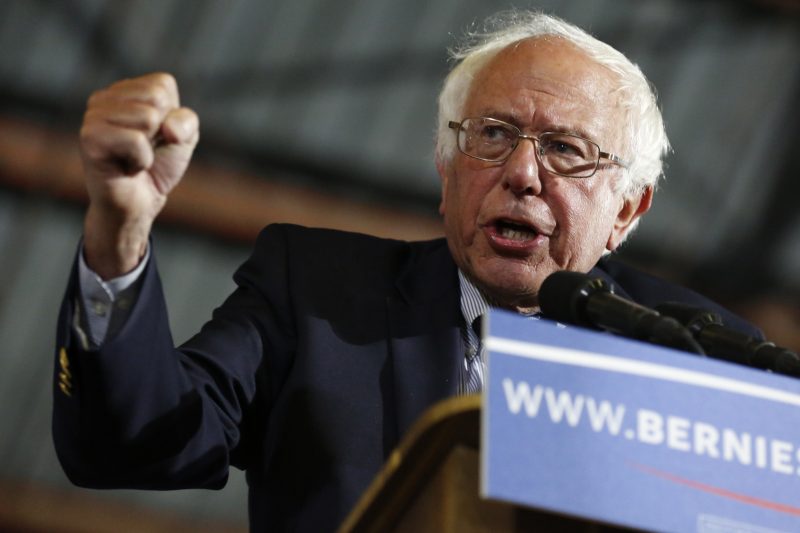The Sanders effect: 2020 hopeful has pulled Democrats leftward
After a surprisingly strong bid for the Democratic nomination in 2016, independent US Senator Bernie Sanders is jumping into the 2020 presidential race for another run (JONATHAN ALCORN)
Washington (AFP) – Once declared too radical by Democratic leaders, the policies pushed by Bernie Sanders including universal health care have tilted toward mainstream party acceptance, themes he and several rival progressives will uphold on the US presidential campaign trail.
Sanders on Tuesday became the latest figure to seek the Democratic nomination to challenge Donald Trump for the White House in 2020, squaring off against several other progressives who have embraced many of the issues he championed during his visionary first presidential bid.
Back in 2016, debate swirled about pushing for a substantial expansion of health coverage through “Medicare for All,” raising the US minimum wage to $15 per hour, free tuition at public colleges, and aggressively combatting climate change.
“We were told that all of these concepts were ideas that the American people would never accept,” Sanders said in a video launching his candidacy.
“Well, three years have come and gone, and as a result of millions of Americans standing up and fighting back, all of these policies and more are now supported by a majority of Americans.”
Of the major Democrats already in the race, several espouse progressive policies popularized by Sanders.
Senators Kamala Harris, Cory Booker, Elizabeth Warren and Kirsten Gillibrand, all 2020 candidates, co-sponsored his Medicare for All legislation in 2017.
Julian Castro, another Democratic hopeful, joins Gillibrand in supporting universal early childhood education.
And Warren, Booker and Harris have all proclaimed support for the Green New Deal, an ultra-progressive platform to combat climate change that was unveiled this month by congresswoman Alexandria Ocasio-Cortez, a rising liberal star.
“I got laughed at three years ago when I said climate change is one of the great crises facing our planet,” Sanders told Vermont Public Radio on Tuesday. “People are not laughing now.”
– Embracing socialism? –
Trump’s re-election team seized on Sanders’ announcement as an opportunity to blast his Democratic rivals for supporting an extremist agenda.
“Every candidate is embracing his brand of socialism,” the Trump 2020 campaign said in a statement.
Sanders has nevertheless had tremendous influence on the party.
“It’s a sign of Sanders’ success that he now has so many imitators,” Dante Scala, a political science professor at the University of New Hampshire, told AFP.
Following November’s midterm elections, the Congressional Progressive Caucus — co-founded by Sanders in 1991 — wields more power than at any time in its history.
“We’re seeing 2020 candidates adopting his ideas,” Scala added. “And I think his ideas are becoming a marker, or a dividing line, among the primary contenders.”
Some candidates have already sought to distance themselves from the 77-year-old liberal, as Harris did last weekend during her first-ever visit to New Hampshire, the state which votes second in the nominating process, after Iowa.
“The people of New Hampshire will tell me what’s required to compete in New Hampshire,” she said at a campaign event in Concord. “But I will tell you I am not a democratic socialist.”
Senator Amy Klobuchar, a Democrat known for forging consensus across party lines, said this week that the Green New Deal and positions like Medicare for All were currently more aspirational than realistic.
As an example she rejected the prospect of tuition-free college. “If I was a magic genie and could give that to everyone and we could afford it, I would,” she said at a town hall.
But a leftward shift in Democratic politics is underway.
“The 2018 elections certainly confirmed that, to a certain extent,” said James Thurber, a government professor at American University.
“Many new Democratic members were elected on Medicare for All and more support for higher education.”
Scala, the New Hampshire professor, said the effects of the Great Recession of a decade ago keep reverberating through American life, ultimately bringing out “the strain of populism” that led to Sanders and Trump.
Sanders was an outsider candidate three years ago. But with his massive political network, muscular fundraising capacity, and resilient message, he is now a frontrunner.
He would need to best multiple formidable rivals — including former vice president Joe Biden, should he enter the race — and victory is anything but assured.
Sanders could become a “prophetic figure in the party who moved the party with a message, but never actually becomes the nominee,” Scala said.
“So his ideas win, but he may not.”
Disclaimer: This story is published from a syndicated feed. Siliconeer does not assume any liability for the above story. Validity of the above story is for 7 Days from original date of publishing. Content copyright AFP.


